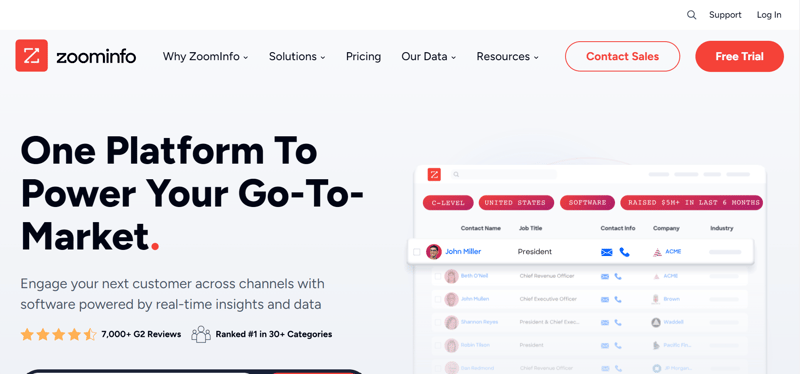
A Guide to Sales Intelligence Tools [Benefits, Types & Top 7 Software]
 Updated on
Updated on
 By Robins Dorvil
By Robins Dorvil
Robins Dorvil
With over 7 years of experience in the insurance industry, 4+ years as an Account Executive at Ringy CRM, and 17 years as a Creative Real Estate Inves...
learn more
Robins Dorvil
With over 7 years of experience in the insurance industry, 4+ years as an Account Executive at Ringy CRM, and 17 years as a Creative Real Estate Inves...
Table of Contents
Table of Contents
Question for you:
How are you and your sales reps gathering intel on your prospective buyers?
No, we're not talking about hanging around outside your customer's office trying to find out which of your competitors' products they're already using.
We're talking about sales intelligence: details on your prospects like purchase intent signals, firmographic data, and yeah, a little bit of tech stack intel.
Most reps are going blind; they know very little about the person on the other end of the phone (or Zoom call, or LinkedIn InMail thread), short of what that customer has told them.
So, ready to get the upper hand?
This article will discuss how sales intelligence can boost sales cycle speeds, improve needs identification, and help you find the right buyers faster.
What Is Sales Intelligence?
Sales intelligence is basically a subset of sales software tools that helps teams gather insights on their customers beyond what they've submitted in a lead generation form. The most basic example is firmographic (like how many employees a customer has or how much revenue they make).
Let's walk through an example.
Your sales team receives a new B2B lead. The lead form your prospective customer has filled in includes the following information:
- Company name
- Company industry
- Key contact name
- Contact phone number and email address
- The product/service they're interested in
A good start, sure, but not enough to hold a robust sales conversation about the customer's needs and challenges, and how your product or service can help service said needs and challenges.
Yes, much of this you'll need to uncover during the sales process, but sales intelligence can give you a headstart.
For example, your automated sales intelligence software tool might offer the following insights:
- How many employees the customer has
- How much revenue the customer generates annually
- The software tools the customer is already using
- Whether there are any active purchase intent signals (for example, the key decision maker posting on social media about an issue you solve)
Now, your rep can open the conversation with a lot more data at hand, putting them in a more advantageous position to close that deal.
Benefits of Sales Intelligence Software

The benefits of utilizing a sales intelligence platform are extensive, impacting every stage of the sales cycle from prospecting to closing. By using sales intelligence solutions, companies can enjoy the following benefits:
1. Improved Lead Quality and Targeting
Automated sales intelligence allows businesses to identify and focus on the highest-quality leads. This is achieved by creating comprehensive ideal customer profiles and then using data to find prospects that fit those exact criteria.
For example, a business intelligence sales platform can analyze firmographic, technographic, and intent data to pinpoint companies that are actively researching solutions like yours.
By focusing on these high-potential leads, sales teams can improve their prospecting efficiency. In fact, nurtured leads can lead to a 20% increase in sales opportunities compared to non-nurtured leads.
2. Better Customer Insights for Personalization
A key benefit of sales intelligence solutions is the deep insight they provide into a prospect's needs and pain points. This sales intelligence data goes beyond basic contact information, offering details on a company's organizational structure, recent news, technology stack, and even the interests of key decision-makers.
As a result, the data helps in the following ways:
- Deepened Customer Understanding: Sales intelligence tools provide a 360-degree view of the customer, allowing reps to understand their history, preferences, and motivations.
- More Relevant Conversations: With detailed insights, sales professionals can engage in more meaningful conversations, addressing specific challenges and positioning their product as a precise solution.
- Proactive Engagement: Sales intelligence software can alert reps to trigger events, such as a company's recent funding or a new job posting, providing the perfect opportunity for a timely and relevant outreach.
3. Increased Efficiency and Reduced Wasted Effort
Sales tools software streamlines and automates many of the time-consuming tasks traditionally associated with sales. This frees up sales professionals to do what they do best, which is selling.
Studies show that sales reps spend only about one-third of their time actually selling, with the rest consumed by administrative work and searching for leads. The best sales intelligence software helps reclaim this lost time.
4. Higher Conversion Rates and Revenue Growth
When reps can focus on high-quality leads, personalize their outreach, and engage with prospects at the right moment, they are far more likely to close deals. In fact, companies that use sales intelligence solutions have been shown to have a significant competitive advantage.
Here's why:
- Improved Win Rates: The insights from sales intelligence platforms enable sales teams to increase their win rates based on forecasted deals.
- Faster Sales Cycles: By connecting with more qualified leads and providing relevant information, sales teams can significantly shorten their sales cycles.
- Increased Sales Productivity: The use of sales intelligence has been shown to boost sales productivity, with some organizations seeing up to a 3x boost in revenue per employee rep when using AI to automate manual tasks and surface valuable insights.
5. Enhanced Forecasting and Pipeline Accuracy
Accurate forecasting is critical for any business, and sales intelligence provides the data needed to make reliable predictions.
By analyzing historical data and real-time insights from the sales pipeline, these systems can provide a clear picture of future revenue. This allows for better resource allocation and strategic planning.
Types of Sales Intelligence Tools

There are several types of sales intelligence tools, each designed to address a specific aspect of the sales process. Let's have a look at each of them:
|
Tool Type |
Primary Function |
|
Data Enrichment & Lead Scoring |
Cleanses and enriches contact information and prioritizes leads based on their likelihood to convert. |
|
Prospecting & Lead Generation |
Identifies and finds new potential customers that fit your ideal customer profile. |
|
Intent Data & Buying Signal |
Provides predictive insights by tracking online behavior and identifying when a company is actively in the market for a solution. |
|
Conversation & Call Intelligence |
Analyzes sales calls and emails to provide insights into what makes a conversation successful. |
|
CRM-Integrated Platforms |
Combines multiple sales intelligence functions into a single, unified system that works directly with your CRM. |
Data Enrichment & Lead Scoring Tools
These sales intelligence tools are designed to improve the quality and accuracy of your existing sales intelligence data. They work by taking raw or incomplete contact information and automatically enriching it with verified details such as job titles, company size, and technology used.
Furthermore, they score leads based on a set of criteria, helping salespeople prioritize the most promising prospects.
For example, a B2B sales intelligence platform might automatically score a lead higher if the company has recently received new funding or is hiring for a position relevant to your product.
Prospecting & Lead Generation Tools
Sales intelligence tools help sales teams identify new potential customers that fit their ideal customer profile. They often come with large databases of company and contact information, allowing users to filter by industry, company size, location, and a variety of other criteria to find their ideal customers faster.
This type of sales intelligence company focuses on building and maintaining comprehensive databases that are constantly updated.
Intent Data & Buying Signal Tools
A major advancement in automated sales intelligence is the use of intent data and buying signals. These sales intelligence tools go beyond simple firmographic data by tracking the online behavior of companies and individuals.
They can identify when a company is actively researching a product or service, signaling a high likelihood that they are in the market to buy. This gives salespeople a predictive edge, allowing them to engage with a prospect at the exact moment they are most receptive.
Conversation & Call Intelligence Tools
Conversion and call of sales intelligence software uses artificial intelligence to analyze conversations, both verbal (phone calls) and written (emails and chats). It transcribes and analyzes these interactions to provide insights into what makes a conversation successful, identifying key topics, keywords, and sentiment.
As a result, sales managers and reps understand what resonates with prospects and what doesn't. For instance, it can automatically identify competitor mentions, common objections, or the key selling points that are most effective.
CRM-Integrated Sales Intelligence Platforms
Many sales intelligence solutions are designed to work seamlessly with existing CRM software. These platforms act as an all-in-one solution, bringing together multiple sales tools software functionalities, like data enrichment, prospecting, and intent data, directly into the CRM interface. This means that a sales rep doesn't have to switch between multiple applications to find the information they need.
A well-integrated sales intelligence platform ensures that every piece of data is linked to the correct customer record, providing a unified and comprehensive view. For example, our software, Ringy, is an example of an all-in-one sales intelligence company that can integrate these various functions into a single ecosystem.
How To Choose Software Sales Tools

Convinced now that software sales tools are a must-have for your team, but you're not exactly sure how to determine the tool that you need?
There are five key considerations to bear in mind when assessing different options:
1. Real-time Data Updates and Accuracy
High-performing teams need real-time data updates to capitalize on fleeting opportunities like a company receiving new funding or a key decision-maker changing roles. A system that relies on outdated or inaccurate data can lead to wasted effort and missed opportunities.
Look for sales intelligence software that constantly verifies information from numerous sources, ensuring you have the most up-to-date and reliable information.
2. Integration with CRM and Marketing Tools
An ideal sales intelligence platform should integrate natively with your existing CRM and marketing automation tools. This integration creates a unified ecosystem where data flows effortlessly between systems.
It eliminates data silos, reduces manual data entry, and ensures that every sales professional has a complete view of a prospect's history and engagement directly within their CRM.
3. Automation
Automation allows sales teams to focus on selling rather than on repetitive administrative tasks. The right sales intelligence solution will offer a range of automation features that save time and increase efficiency.
Here's how:
- Drip Campaigns: These automatically send a series of personalized emails or messages to prospects over a set period, keeping them engaged without manual effort.
- Call Tracking: This feature automatically logs call data, including duration, outcome, and notes, into the CRM, saving reps from manual data entry.
- Auto-Dialing: An auto-dialer can automatically call a list of numbers, connecting the rep only when a person answers, drastically increasing the number of calls a rep can make in a day.
4. Analytics and Reporting Dashboards
Effective sales business intelligence is only as good as the insights it provides. A quality sales intelligence platform should have robust analytics and reporting dashboards. These dashboards give sales leaders and reps a real-time view of key performance indicators (KPIs) like pipeline health, lead conversion rates, and team performance. They help in making data-driven decisions and provide a clear picture of what's working and what's not.
5. Scalability and Ease of Use
Finally, consider a sales intelligence solution's scalability and ease of use. A platform should be able to grow with your business, handling an increasing number of users and a growing database without a drop in performance.
Equally important is a user-friendly interface. A complex system with a steep learning curve will suffer from low adoption rates, regardless of its features. The best sales intelligence tools are intuitive and easy for sales reps to pick up, ensuring they are used consistently across the team.
How to Choose the Right Sales Intelligence Platform
The ideal sales intelligence solution should align with your business objectives, industry specifics, and budget, while also being user-friendly and supported by a great team
Define Your Sales Goals and Challenges
Are you looking to improve lead generation, increase conversion rates, or shorten the sales cycle? For example, if your primary challenge is finding high-quality leads, a sales intelligence platform with strong intent data and accurate contact information would be a priority.
If your team is spending too much time on manual data entry, a solution with robust CRM integration and automation features is key.
A clear understanding of your current challenges will help you prioritize the features you need, preventing you from overspending on functionalities you'll never use.
Consider Industry Fit
The needs of a software sales tools team in the SaaS industry are very different from those in insurance or recruiting. The best sales intelligence companies often have solutions tailored to specific verticals.
For example, a platform for recruiting might prioritize finding candidates with specific skills and employment histories, while a tool for the insurance industry may focus on demographic and behavioral data to identify potential policyholders.
Choosing a solution with a strong industry fit ensures the data and features provided are directly relevant to your business model.
Balance Cost vs. Features
When evaluating a sales intelligence solution, it's crucial to perform a ROI analysis. For instance, a platform that helps you save 10 hours a week on prospecting per sales rep can quickly justify its cost through increased sales productivity and revenue.
A proper ROI analysis should consider:
- Increased qualified leads
- Reduced sales cycle
- Higher conversion rates
Evaluate Onboarding, Training, and Customer Support
Even the most advanced automated sales intelligence tool is useless if your team doesn't know how to use it. When making a choice, ask about the vendor's onboarding process, the availability of training resources, and the quality of their customer support.
Look for a partner that provides dedicated support and a clear plan for implementation. Platforms with high user satisfaction ratings on ease of use and quality of support, as reported by reviews, are often a safer bet for a smooth rollout and long-term success.
Look for Customization and Automation Flexibility
Your sales process is unique, and your sales intelligence platform should be adaptable to it. Look for solutions that allow for a high degree of customization and automation flexibility.
This includes the ability to build custom lead scoring models, tailor reporting dashboards to your specific KPIs, and create automated workflows that fit your team's unique sales process. A flexible sales technology tool will grow with your business and can be fine-tuned over time to maximize its effectiveness.
Top 7 Sales Intelligence Platforms
So, now it's time to choose an actual sales intelligence platform to access all of those helpful insights.
But which one? Here, we'll look at the top seven software tools so you can choose the best option for your needs.
*Note: All pricing accurate as of September 2025*
|
Platform |
Pricing* |
Key Features |
|
From US$119.99/month |
|
|
|
Unspecified |
|
|
|
From $49 per month |
|
|
|
Unspecified |
|
|
|
Unspecified |
|
|
|
Unspecified |
|
|
|
From $29.90 per user/month |
|
1. LinkedIn Sales Navigator

LinkedIn Sales Navigator is a premier sales intelligence tool built for prospecting and gathering high-level insights directly from the world's largest professional network. It's an upgraded version of the standard LinkedIn platform, offering a wealth of data not available in the free version.
Its AI-powered capabilities are a standout feature, providing intelligent lead suggestions based on your history and search criteria.
- Key Features: Advanced search filters to pinpoint ideal leads and companies, real-time alerts on key buying signals (like job changes), seamless integration with popular sales CRMs to sync lead data, and the ability to add notes and tags for future follow-up. A new feature called Account IQ provides AI-powered summaries for faster account research.
- Pricing: The Core plan starts at US$119.99/month. Advanced and Enterprise plans with more features, like deeper CRM integration and enhanced reporting, are also available at a higher cost.
2. ZoomInfo

ZoomInfo is a comprehensive sales intelligence platform that provides a wide range of sales and marketing tools across its various products.
From a sales intelligence data perspective, ZoomInfo is known for its extensive and accurate database. It provides essential information like firmographics, technographics, and direct contact details, which are critical for any B2B sales intelligence strategy.
- Key Features: A vast database of company data, including firmographics, technographics (the technology a company uses), and employee hierarchy. It provides key decision-maker contact information, including direct phone numbers and email addresses, as well as buyer intent data to identify active prospects.
- Pricing: ZoomInfo doesn't publicly share pricing, as it's highly customized based on your specific needs.
3. Apollo.io

Apollo.io is an all-in-one sales intelligence and engagement platform. It boasts a massive database of over 275 million contacts and 70+ data points per profile, making it a powerful resource for lead generation. The platform provides AI-powered insights to help you find and target your ideal customer profile (ICP).
- Key Features: A database of over 275 million prospects with information like job updates, funding data, and Alexa rankings. Its AI-powered Persona Lookalike functionality helps you build an ideal customer profile and get automated recommendations. It offers an integrated sales engagement suite for email and call automation.
- Pricing: Apollo.io offers a free plan with limited credits. Paid plans start at $59 per user per month for the Basic plan, with Professional and Organizational tiers available at $99 and $149 per user, per month respectively (billed monthly).
4. Outreach

While known as a sales engagement platform, Outreach has expanded its offerings with robust sales intelligence tools under the brand Outreach Guide. This sales intelligence solution is heavily focused on leveraging AI and automation to enhance the sales workflow.
- Key Features: AI-powered sales sequences, which automate multi-channel outreach; real-time conversation intelligence to analyze calls and provide insights; and recommendations for best practice action plans to guide reps. The platform also includes a centralized resource library and content cards for sales enablement.
- Pricing: Pricing is not publicly listed and requires speaking with a sales representative for a custom quote.
5. Groove by Clari

Groove is a sales productivity platform that integrates deeply with Salesforce and is now part of the Clari family. While its primary function is to streamline sales processes, its sales intelligence capabilities are focused on conversation intelligence and revenue analytics.
- Key Features: Conversation intelligence to analyze sales conversations and identify key themes; workflow management to automate repetitive tasks; and revenue intelligence to provide AI-powered insights into sales performance. It also includes an online meeting scheduler and deep integrations with other popular software sales tools.
- Pricing: Groove does not publicly disclose its pricing. You must contact their sales team for a custom quote.
6. 6sense

6sense brands itself as a revenue AI platform, focusing on predictive insights and account-based marketing. This sales intelligence software uses a patented buying prediction algorithm to identify accounts that are in-market and actively searching for solutions like yours, even before they engage with your company.
- Key Features: Alerts on accounts that are actively searching for a solution, patented buying prediction algorithm to score and prioritize leads, and firmographic data enrichment to provide a complete view of your target accounts.
- Pricing: 6sense does not publish its pricing. Reports indicate that annual contracts typically start around $25,000 and can exceed $100,000 for full enterprise implementations.
7. Lusha

Lusha is a straightforward and user-friendly B2B sales intelligence database that emphasizes data accuracy and verification. It's a popular choice for list-building and data enrichment, helping sales reps get the right contact information quickly.
- Key Features: A seven-step data verification process to ensure accuracy, a convenient web extension for real-time prospecting, and a robust list-building platform. It is a reliable source for contact and company data, providing verified email addresses and phone numbers.
- Pricing: Lusha offers a free version with a limited number of credits. Paid plans start at $29.90 per user per month for the Pro plan and $69.90 per user per month for the Premium plan, with a custom plan available upon request.
Conclusion: Leverage Your Sales Intelligence With a CRM
By now, you should be intimately familiar with the details of sales intelligence software tools, the most popular options out there, and of course, how to choose the right platform for you.
But here's the thing:
Most of these aren't standalone tools, and they can't support your team throughout the entire sales process.
For that, you'll need a robust CRM platform that allows you to integrate your sales intelligence tool and store all of that important customer data in one place.
But you've done enough choosing for one day, so once you've signed up for a sales intelligence platform, check out Ringy, then book a demo with our team and supercharge your sales outreach process.

Skyrocket your sales with the CRM that does it all.
Calling? Check. SMS? Check. Automation and AI? Check. Effortlessly keep in touch with your customers and boost your revenue without limits.

Take your sales to new heights with Ringy.
Sales in a slump? Ringy gives you the tools and flexibility you need to capture leads, engage with them, and turn them into customers.
Subscribe to Our Blog
Enter your email to get the latest updates sent straight to your inbox!
Categories
Related Articles
























































































